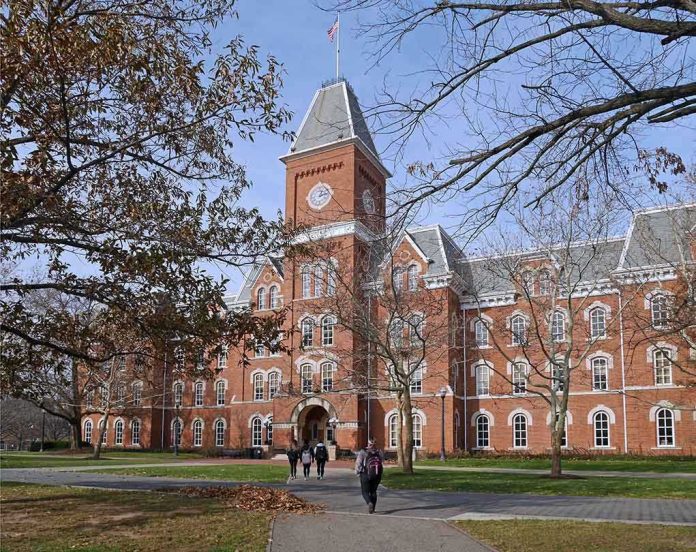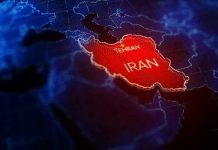
One professor’s removal from her classroom for showing a “white supremacy pyramid” that labeled MAGA as covert racism has pushed Indiana’s academic freedom debate into the national spotlight—and left everyone questioning who really gets to define diversity of thought.
Story Snapshot
- An Indiana University lecturer was ousted after showing a controversial graphic labeling MAGA as “covert white supremacy.”
- The incident triggered an investigation under Indiana’s new “intellectual diversity” law, SEA 202.
- State and federal political figures, including Senator Jim Banks, became directly involved.
- The episode has sparked a fierce debate over academic freedom, due process, and the future of classroom discussion.
SEA 202 Collides with the Classroom: The Event That Sparked the Firestorm
Jessica Adams, a social work lecturer at Indiana University, made a routine choice for her “Diversity, Human Rights, and Social Justice” class—she used the “pyramid of white supremacy” graphic. The visual, widely known yet deeply divisive, mapped out levels of white supremacy, placing “Make America Great Again” among “covert” forms. One student found the inclusion of MAGA intolerable, filed a formal complaint, and set in motion a process that would test the boundaries of a state’s new law and a university’s resolve.
Within days, Adams received a letter from university administrators: she was removed from teaching the class while an investigation began. Guest lecturers took over. The student’s complaint didn’t just go to school officials—it reached the office of U.S. Senator Jim Banks, raising the stakes from campus controversy to a matter of national political theater. Adams’ removal swiftly became a flashpoint for both sides of America’s ongoing cultural battle over education, free expression, and political power.
SEA 202 and Its Ripple Effects: Law, Power, and Political Influence
Indiana’s SEA 202, passed in 2024, was billed as a safeguard for intellectual diversity in universities. The law allows students to report faculty who allegedly fail to represent a range of viewpoints. Supporters say it protects students from ideological indoctrination; critics argue it empowers political actors to police the classroom. The Adams case shows how quickly a single complaint can escalate when state law, university bureaucracy, and federal politics collide. Administrators acted swiftly—removing Adams before any formal findings and assigning guest lecturers, signaling a new era of caution and compliance for faculty across the state.
The involvement of Senator Banks’ office was unprecedented and underscored the growing role of politicians in academic disputes. The School of Social Work’s leadership conducted preliminary interviews and themselves became complainants, raising questions about due process. Meanwhile, Adams maintained she was teaching established material essential for social work education, not partisan advocacy. Her supporters and the American Association of University Professors (AAUP) warned that this process risked turning universities into ideological battlegrounds—chilling open dialogue and undermining the educational mission.
Student Impact and the Chilling Effect on Academic Freedom
For students enrolled in the disrupted class, the fallout was immediate: confusion, uncertainty, and a sense of being caught in a public spectacle. Guest lecturers filled the gap, but students and Adams both described the process as opaque and lacking clear communication. The investigation dragged on through November 2025 with no resolution in sight. Adams was allowed to continue teaching her other courses but remained barred from the contested class.
Faculty statewide watched closely. The risk of being removed over controversial material—even when it aligns with professional standards—became a new reality. Critics of the university’s response highlighted the lack of due process and the potential for self-censorship. SEA 202, they argued, wasn’t ensuring viewpoint diversity; it was incentivizing silence. The episode’s ripple effects extended beyond Indiana, as other states and universities grappled with similar laws and pressures.
National Debate and the Uncertain Road Ahead
This case has become a litmus test for the future of higher education in America. On one side, advocates for SEA 202 and similar laws assert that universities must protect students from bias and present a balanced spectrum of ideas. On the other, academic freedom defenders warn that such laws are easily weaponized, threatening the very discussion and debate they claim to foster. The inclusion of MAGA in a white supremacy hierarchy remains especially contentious, igniting passions about the boundaries between free speech and political expression.
With the investigation ongoing, Adams’ fate—and the policy’s true impact—remains unresolved. Yet one thing is clear: universities, once havens for vigorous intellectual exchange, are now contested arenas where classroom content, political ideology, and legislative mandates intersect in unpredictable ways. The story at Indiana University is not unique, but its outcome may set the tone for the next chapter of America’s debate over who controls the classroom—and what can be said within its walls.
Sources:
Indiana University AAUP Press Release
Indiana Public Media (IPM) reporting









